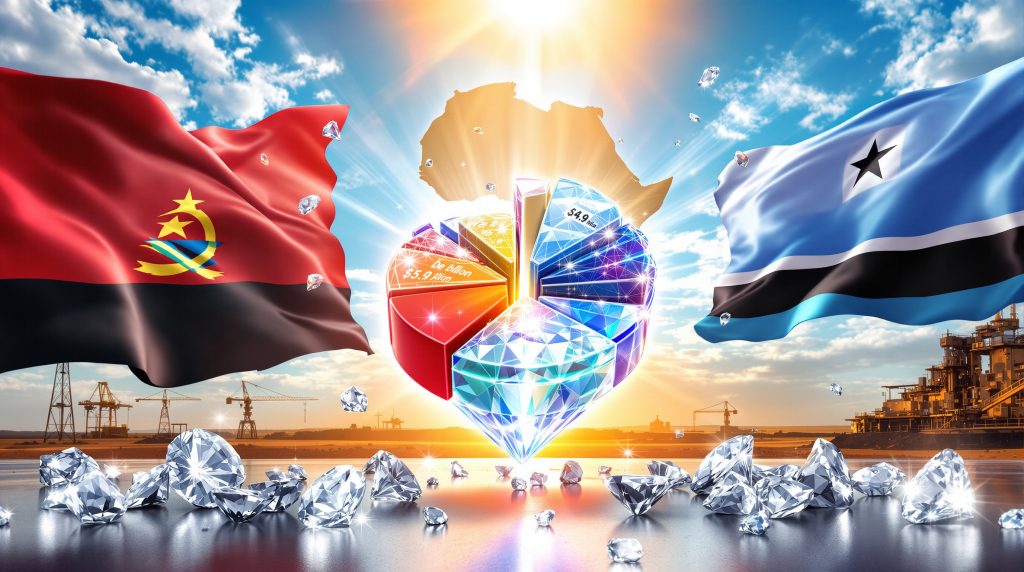The Continental Diamond Power Play: Angola's Strategic Challenge to Botswana
The African diamond industry stands at a pivotal crossroads as Angola's bid for De Beers positions the country to acquire majority control of the world's most influential diamond company. This bold maneuver has transformed collaborative discussions into a continental rivalry, with Angola directly challenging Botswana's decades-long partnership with the $4.9 billion diamond giant.
The stakes extend far beyond corporate ownership. Angola's bid represents a fundamental shift in how African nations approach resource sovereignty, moving from passive extraction to strategic value chain control. This acquisition attempt signals a new era of African resource nationalism, where mineral-rich countries seek to capture greater economic value from their natural endowments.
De Beers: The Crown Jewel of Global Diamond Markets
De Beers represents more than a mining operation—it embodies over a century of diamond industry dominance. The company maintains significant influence over global rough diamond pricing and controls sophisticated marketing networks that shape consumer demand worldwide. Its integrated business model encompasses every stage from exploration to retail, creating unprecedented market power.
The company's technological capabilities represent decades of accumulated expertise in diamond recovery, geological assessment, and processing innovations. These proprietary systems enable efficient extraction from increasingly challenging deposits while maintaining quality standards that command premium pricing in international markets.
Anglo American's decision to divest De Beers stems from strategic restructuring toward clean energy metals, particularly copper. This pivot creates an extraordinary opportunity for resource-rich African nations to assume control of assets previously managed by international mining conglomerates.
Angola's Transformation from Regional Producer to Global Contender
Angola has experienced remarkable growth in diamond production capabilities, establishing itself as a formidable competitor in African mining circles. The country's strategic partnerships with international operators have accelerated technological advancement and operational expertise development across its diamond-bearing regions.
State-owned mining company Endiama has evolved from a domestic operator to a sophisticated enterprise capable of pursuing complex international acquisitions. This transformation reflects broader economic diversification efforts as Angola reduces dependence on petroleum exports whilst maximising value from mineral resources.
The country's geological advantages include extensive unexplored diamond-bearing formations that could yield significant discoveries with proper technological investment. Access to De Beers' exploration methodologies and processing capabilities could unlock substantial value from these undeveloped concessions.
The Strategic Calculus Behind Angola's Bid
Value Chain Integration and Profit Maximisation
Angola's primary motivation centres on capturing enhanced margins through vertical integration. Currently, the country receives commodity pricing for rough diamonds, but controlling De Beers would provide access to polishing, marketing, and retail operations that generate substantially higher returns.
This integration strategy aligns with broader African development philosophies emphasising value-added processing rather than raw material exportation. Success would demonstrate how resource-rich nations can leverage natural endowments for comprehensive economic advancement.
Technological Advancement and Operational Excellence
The acquisition would grant Angola immediate access to proprietary mining technologies developed over decades of industry leadership. These innovations could accelerate development across Angola's diamond portfolio whilst improving recovery rates and operational efficiency.
De Beers' exploration capabilities represent particular value, as systematic geological assessment could reveal additional high-grade deposits within Angola's extensive mineral territories. This technological transfer could position Angola as a dominant global producer for generations.
Market Influence and Pricing Power
Ownership would elevate Angola from price-taker to price-setter in global diamond markets. This influence extends beyond immediate financial benefits to include strategic leverage in international commodity negotiations and enhanced diplomatic positioning.
The company's established relationships with luxury brands and retail networks would provide Angola direct access to high-value consumer markets, bypassing traditional intermediaries that capture significant value in the distribution chain.
Botswana's Defensive Strategy and Historical Claims
Botswana's response reflects existential economic concerns, as diamond revenues contribute approximately 70% of the country's export earnings. The nation currently owns 15% of De Beers whilst contributing roughly 70% of the company's annual rough diamond production, creating significant operational interdependence.
This production relationship provides Botswana substantial negotiating leverage, as any ownership change must consider operational continuity across major mining sites. The country's established infrastructure and experienced workforce represent critical assets for maintaining production levels.
Botswana has framed this competition in terms of economic sovereignty, emphasising historical partnerships and strategic national interests. Government officials argue that maintaining De Beers control is essential for protecting the country's primary economic foundation.
The nation possesses matching rights for external acquisition offers, providing potential tactical advantages in competitive bidding scenarios. These contractual protections could force Angola's bid for De Beers to involve direct negotiations with Botswana rather than pursuing unilateral acquisition strategies.
Financial Complexities and Funding Challenges
Angola's Finance Minister Vera Daves de Sousa has explicitly stated that national budget resources will not fund Endiama's acquisition bid. This declaration creates uncertainty about financing mechanisms whilst potentially signalling sophisticated international funding arrangements.
The $4.9 billion valuation presents substantial funding challenges, particularly considering De Beers has recorded $3.5 billion in impairments over recent years. These write-downs reflect challenging market conditions including synthetic diamond competition and changing consumer preferences.
Alternative financing structures could include resource-backed securities, international development funding, or partnership arrangements with sovereign wealth funds. Angola's petroleum revenues and mineral resources provide substantial collateral for creative financing solutions.
The absence of direct government funding might indicate private sector involvement or international strategic partnerships that could provide necessary capital whilst maintaining Angolan control over operational decisions. Furthermore, the complexity mirrors broader mining consolidation trends across the industry.
Market Dynamics and Industry Disruption
Synthetic Diamond Competition and Pricing Pressure
The diamond industry faces unprecedented challenges from laboratory-grown alternatives that offer similar aesthetic properties at significantly reduced costs. This technological disruption has compressed natural diamond margins whilst forcing traditional producers to emphasise provenance and exclusivity.
Consumer preferences continue evolving toward sustainable and ethically sourced products, creating opportunities for African producers who can demonstrate responsible mining practices and community development contributions. However, market volatility affects global gold price analysis patterns across precious commodities.
Supply Chain Transformation
Angola's potential control of De Beers could reshape global diamond distribution networks, potentially favouring African processing and value-addition over traditional European and North American centres.
This geographic shift could create new employment opportunities across African diamond-producing regions whilst reducing dependence on established international trading relationships. In addition, developments in modern mine planning technology could revolutionise operational efficiency.
Regional Implications and Continental Strategy
African Resource Nationalism
Angola's bid represents broader continental trends toward resource sovereignty and value chain control. Success could inspire similar acquisitions across various commodity sectors, from precious metals to agricultural products.
The competition demonstrates growing African financial capabilities and strategic sophistication in international business transactions. This development challenges traditional assumptions about African nations' roles in global commodity markets.
Regional Cooperation and Competition Balance
Whilst Angola and Botswana compete for De Beers control, both nations share interests in maintaining African influence over continental mineral resources. The outcome could establish precedents for future regional cooperation or competition dynamics.
Technical expertise and infrastructure sharing could benefit both countries regardless of acquisition results, as diamond industry knowledge transfer accelerates regional development capabilities. This reflects broader patterns, including recent Namibian mining halt decisions affecting regional markets.
International Context and Global Implications
Investment Community Response
International investors monitor this acquisition closely as an indicator of African institutional capabilities and strategic vision. Successful completion would demonstrate sophisticated financial structuring and operational planning abilities.
Global mining companies may reassess African partnership strategies if local entities prove capable of managing complex international acquisitions independently. Furthermore, initiatives like South Africa beneficiation demonstrate continental commitment to value-chain integration.
Supply Security and Market Stability
Changes in De Beers ownership could affect international supply security perceptions, particularly among luxury brands and retail partners who rely on consistent quality and delivery schedules.
Market stability considerations include potential operational disruptions during ownership transitions and longer-term strategic direction changes under new management structures. External industry analysts have provided comprehensive coverage of the acquisition implications.
Technical and Operational Considerations
Mining Technology Integration
De Beers' proprietary recovery technologies represent significant value for any acquiring entity. These systems enable efficient processing of complex ore bodies whilst maintaining environmental compliance standards.
Geological modelling capabilities could unlock value across Angola's unexplored diamond concessions through systematic assessment and development planning methodologies. Consequently, technological transfer could revolutionise Angola's entire mineral sector.
Infrastructure and Logistics Networks
The company's established processing facilities and distribution networks provide immediate operational capabilities that would take decades to develop independently.
Transportation and security systems for diamond movement represent sophisticated logistical capabilities essential for maintaining operational efficiency and product integrity.
Risk Assessment and Challenge Analysis
Regulatory and Compliance Requirements
Cross-border mining acquisitions involve extensive regulatory approvals across multiple jurisdictions. Environmental assessments, labour compliance, and community development obligations create complex approval processes.
International trade regulations and export control requirements could complicate operational integration whilst requiring substantial legal and administrative resources. However, successful acquisitions would set precedents for future African transactions.
Market Volatility and Economic Uncertainty
Diamond market volatility reflects broader luxury goods sensitivity to economic cycles. Acquisition success depends partly on market recovery and sustained consumer demand for natural diamonds.
Currency fluctuations between African nations and international markets could affect operational profitability and debt service capabilities under various financing structures. For instance, market instability has created challenges documented in industry reports.
Future Scenarios and Strategic Outcomes
Successful Angola Acquisition
If Angola successfully acquires majority control, the country would gain unprecedented influence over global diamond pricing whilst establishing precedents for African resource control initiatives.
This outcome could accelerate technological development across Angola's mineral sector whilst providing enhanced revenue streams for economic diversification programmes. Moreover, success would validate Angola's bid for De Beers as a strategic masterstroke.
Botswana Counterbid Success
Botswana's exercise of matching rights could maintain existing operational relationships whilst potentially involving regional African partnerships for enhanced strategic positioning.
Continued Botswana control might preserve established supply chain relationships whilst limiting Angola's strategic expansion ambitions in continental mining sectors.
Alternative International Solutions
Success by non-African bidders could frustrate continental resource sovereignty objectives whilst potentially offering different technological and financial benefits for regional development.
International ownership might provide enhanced access to global capital markets whilst potentially limiting African strategic control over continental mineral resources.
Investment and Market Analysis
Valuation Considerations
De Beers' current $4.9 billion valuation reflects recent impairments and challenging market conditions. Potential buyers must assess long-term recovery prospects against current operational challenges.
Asset quality includes proven reserves, processing infrastructure, and established brand relationships that provide sustainable competitive advantages in global markets. Nevertheless, market conditions continue affecting valuations across the precious commodities sector.
Strategic Value Assessment
Beyond immediate financial returns, De Beers ownership provides strategic positioning in global luxury markets and influence over industry standards and practices.
Technology transfer value could justify premium pricing if acquiring entities can successfully apply innovations across broader mineral portfolios. Consequently, the acquisition represents more than simple corporate consolidation.
Conclusion: Defining Moment for African Mining Sovereignty
Angola's bid for De Beers represents more than corporate acquisition—it symbolises Africa's evolving approach to resource management and value creation. The competition demonstrates growing continental capabilities in complex international transactions whilst highlighting strategic vision for economic transformation.
Regardless of outcome, this bidding process has elevated African influence in global commodity discussions whilst proving continental entities can compete effectively with established international operators. The precedent could inspire similar resource sovereignty initiatives across various African mineral sectors.
The stakes extend beyond immediate ownership to encompass broader questions of African economic independence and strategic resource control. Success would validate continental approaches to value chain integration whilst failure might reinforce traditional international dominance patterns.
This acquisition attempt occurs at a critical juncture when global supply chains are restructuring and traditional commodity relationships face disruption. Angola's bid for De Beers represents African ambitions to capture greater value from natural endowments whilst building sustainable economic foundations for future generations.
The diamond industry's future may depend on how successfully African nations can transition from raw material suppliers to integrated operators capable of competing across entire value chains. Angola's challenge to Botswana over De Beers control will likely influence continental resource strategies for decades to come.
Ready to Capitalise on the Next Major Mineral Discovery?
Discovery Alert instantly alerts investors to significant ASX mineral discoveries using its proprietary Discovery IQ model, turning complex mineral data into actionable insights for both short-term trading and long-term investment opportunities. Explore how historic mineral discoveries can generate substantial returns and begin your 30-day free trial today to position yourself ahead of the market.




